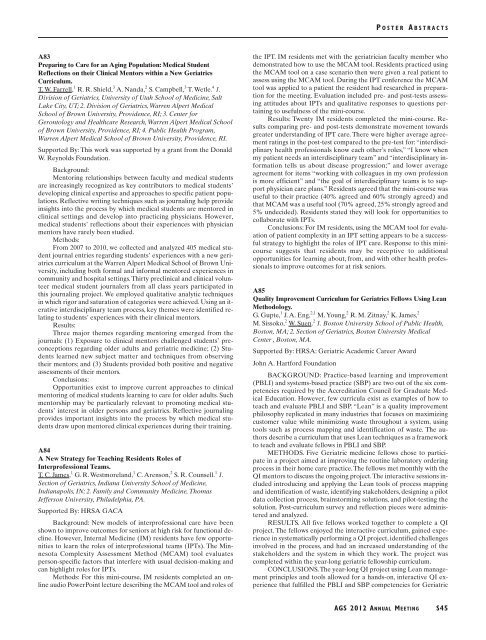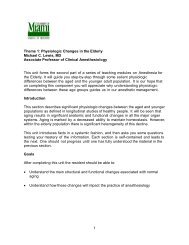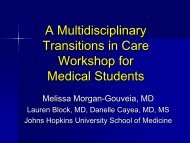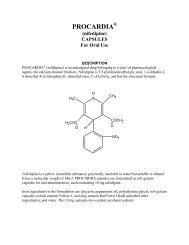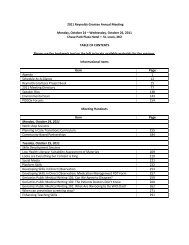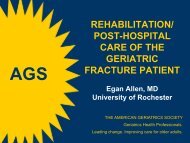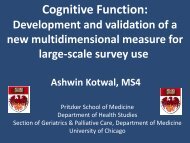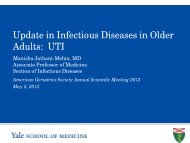Here - American Geriatrics Society
Here - American Geriatrics Society
Here - American Geriatrics Society
You also want an ePaper? Increase the reach of your titles
YUMPU automatically turns print PDFs into web optimized ePapers that Google loves.
P OSTER<br />
A BSTRACTS<br />
A83<br />
Preparing to Care for an Aging Population: Medical Student<br />
Reflections on their Clinical Mentors within a New <strong>Geriatrics</strong><br />
Curriculum.<br />
T. W. Farrell, 1 R. R. Shield, 3 A. Nanda, 2 S. Campbell, 3 T. Wetle. 4 1.<br />
Division of <strong>Geriatrics</strong>, University of Utah School of Medicine, Salt<br />
Lake City, UT; 2. Division of <strong>Geriatrics</strong>, Warren Alpert Medical<br />
School of Brown University, Providence, RI; 3. Center for<br />
Gerontology and Healthcare Research, Warren Alpert Medical School<br />
of Brown University, Providence, RI; 4. Public Health Program,<br />
Warren Alpert Medical School of Brown University, Providence, RI.<br />
Supported By: This work was supported by a grant from the Donald<br />
W. Reynolds Foundation.<br />
Background:<br />
Mentoring relationships between faculty and medical students<br />
are increasingly recognized as key contributors to medical students’<br />
developing clinical expertise and approaches to specific patient populations.<br />
Reflective writing techniques such as journaling help provide<br />
insights into the process by which medical students are mentored in<br />
clinical settings and develop into practicing physicians. However,<br />
medical students’ reflections about their experiences with physician<br />
mentors have rarely been studied.<br />
Methods:<br />
From 2007 to 2010, we collected and analyzed 405 medical student<br />
journal entries regarding students’ experiences with a new geriatrics<br />
curriculum at the Warren Alpert Medical School of Brown University,<br />
including both formal and informal mentored experiences in<br />
community and hospital settings. Thirty preclinical and clinical volunteer<br />
medical student journalers from all class years participated in<br />
this journaling project. We employed qualitative analytic techniques<br />
in which rigor and saturation of categories were achieved. Using an iterative<br />
interdisciplinary team process, key themes were identified relating<br />
to students’ experiences with their clinical mentors.<br />
Results:<br />
Three major themes regarding mentoring emerged from the<br />
journals: (1) Exposure to clinical mentors challenged students’ preconceptions<br />
regarding older adults and geriatric medicine; (2) Students<br />
learned new subject matter and techniques from observing<br />
their mentors; and (3) Students provided both positive and negative<br />
assessments of their mentors.<br />
Conclusions:<br />
Opportunities exist to improve current approaches to clinical<br />
mentoring of medical students learning to care for older adults. Such<br />
mentorship may be particularly relevant to promoting medical students’<br />
interest in older persons and geriatrics. Reflective journaling<br />
provides important insights into the process by which medical students<br />
draw upon mentored clinical experiences during their training.<br />
A84<br />
A New Strategy for Teaching Residents Roles of<br />
Interprofessional Teams.<br />
T. C. James, 1 G. R. Westmoreland, 1 C. Arenson, 2 S. R. Counsell. 1 1.<br />
Section of <strong>Geriatrics</strong>, Indiana University School of Medicine,<br />
Indianapolis, IN; 2. Family and Community Medicine, Thomas<br />
Jefferson University, Philadelphia, PA.<br />
Supported By: HRSA GACA<br />
Background: New models of interprofessional care have been<br />
shown to improve outcomes for seniors at high risk for functional decline.<br />
However, Internal Medicine (IM) residents have few opportunities<br />
to learn the roles of interprofessional teams (IPTs). The Minnesota<br />
Complexity Assessment Method (MCAM) tool evaluates<br />
person-specific factors that interfere with usual decision-making and<br />
can highlight roles for IPTs.<br />
Methods: For this mini-course, IM residents completed an online<br />
audio PowerPoint lecture describing the MCAM tool and roles of<br />
the IPT. IM residents met with the geriatrician faculty member who<br />
demonstrated how to use the MCAM tool. Residents practiced using<br />
the MCAM tool on a case scenario then were given a real patient to<br />
assess using the MCAM tool. During the IPT conference the MCAM<br />
tool was applied to a patient the resident had researched in preparation<br />
for the meeting. Evaluation included pre- and post-tests assessing<br />
attitudes about IPTs and qualitative responses to questions pertaining<br />
to usefulness of the mini-course.<br />
Results: Twenty IM residents completed the mini-course. Results<br />
comparing pre- and post-tests demonstrate movement towards<br />
greater understanding of IPT care. There were higher average agreement<br />
ratings in the post-test compared to the pre-test for: “interdisciplinary<br />
health professionals know each other’s roles,” “I know when<br />
my patient needs an interdisciplinary team” and “interdisciplinary information<br />
tells us about disease progression;” and lower average<br />
agreement for items “working with colleagues in my own profession<br />
is more efficient” and “the goal of interdisciplinary teams is to support<br />
physician care plans.” Residents agreed that the mini-course was<br />
useful to their practice (40% agreed and 60% strongly agreed) and<br />
that MCAM was a useful tool (70% agreed, 25% strongly agreed and<br />
5% undecided). Residents stated they will look for opportunities to<br />
collaborate with IPTs.<br />
Conclusions: For IM residents, using the MCAM tool for evaluation<br />
of patient complexity in an IPT setting appears to be a successful<br />
strategy to highlight the roles of IPT care. Response to this minicourse<br />
suggests that residents may be receptive to additional<br />
opportunities for learning about, from, and with other health professionals<br />
to improve outcomes for at risk seniors.<br />
A85<br />
Quality Improvement Curriculum for <strong>Geriatrics</strong> Fellows Using Lean<br />
Methodology.<br />
G. Gupte, 1 J. A. Eng, 2,1 M. Young, 2 R. M. Zitnay, 2 K. James, 2<br />
M. Sissoko, 2 W. Suen. 2 1. Boston University School of Public Health,<br />
Boston, MA; 2. Section of <strong>Geriatrics</strong>, Boston University Medical<br />
Center , Boston, MA.<br />
Supported By: HRSA: Geriatric Academic Career Award<br />
John A. Hartford Foundation<br />
BACKGROUND: Practice-based learning and improvement<br />
(PBLI) and systems-based practice (SBP) are two out of the six competencies<br />
required by the Accreditation Council for Graduate Medical<br />
Education. However, few curricula exist as examples of how to<br />
teach and evaluate PBLI and SBP. “Lean” is a quality improvement<br />
philosophy replicated in many industries that focuses on maximizing<br />
customer value while minimizing waste throughout a system, using<br />
tools such as process mapping and identification of waste. The authors<br />
describe a curriculum that uses Lean techniques as a framework<br />
to teach and evaluate fellows in PBLI and SBP.<br />
METHODS. Five Geriatric medicine fellows chose to participate<br />
in a project aimed at improving the routine laboratory ordering<br />
process in their home care practice. The fellows met monthly with the<br />
QI mentors to discuss the ongoing project. The interactive sessions included<br />
introducing and applying the Lean tools of process mapping<br />
and identification of waste, identifying stakeholders, designing a pilot<br />
data collection process, brainstorming solutions, and pilot-testing the<br />
solution. Post-curriculum survey and reflection pieces were administered<br />
and analyzed.<br />
RESULTS. All five fellows worked together to complete a QI<br />
project. The fellows enjoyed the interactive curriculum, gained experience<br />
in systematically performing a QI project, identified challenges<br />
involved in the process, and had an increased understanding of the<br />
stakeholders and the system in which they work. The project was<br />
completed within the year-long geriatric fellowship curriculum.<br />
CONCLUSIONS.The year-long QI project using Lean management<br />
principles and tools allowed for a hands-on, interactive QI experience<br />
that fulfilled the PBLI and SBP competencies for Geriatric<br />
AGS 2012 ANNUAL MEETING<br />
S45


